Table of Contents
Craving the ultimate breakfast indulgence? Look no further! We're diving deep into the world of pancake perfection, guided by none other than the queen of culinary arts herself: Martha Stewart. Forget those boxed mixes; we're tackling a pancake recipe from scratch Martha Stewart style, and trust me, it's easier than you think. Get ready to whip up light, fluffy pancakes that will rival any restaurant brunch. This isn't just about a recipe; it's about mastering a technique, understanding the ingredients, and creating a breakfast experience. In this guide, we'll break down every step, from gathering your essential ingredients to mastering the art of the flip. We'll explore why Martha's approach to a pancake recipe from scratch Martha Stewart is so effective, offering tips and tricks to ensure your pancakes are consistently perfect. Plus, we'll share some fun variations and serving suggestions to elevate your pancake game. Whether you're a seasoned cook or a kitchen newbie, prepare to unlock the secrets to a truly unforgettable pancake recipe from scratch Martha Stewart approved! Let's get cooking!
Why Martha Stewart's Pancake Recipe From Scratch is a Game Changer
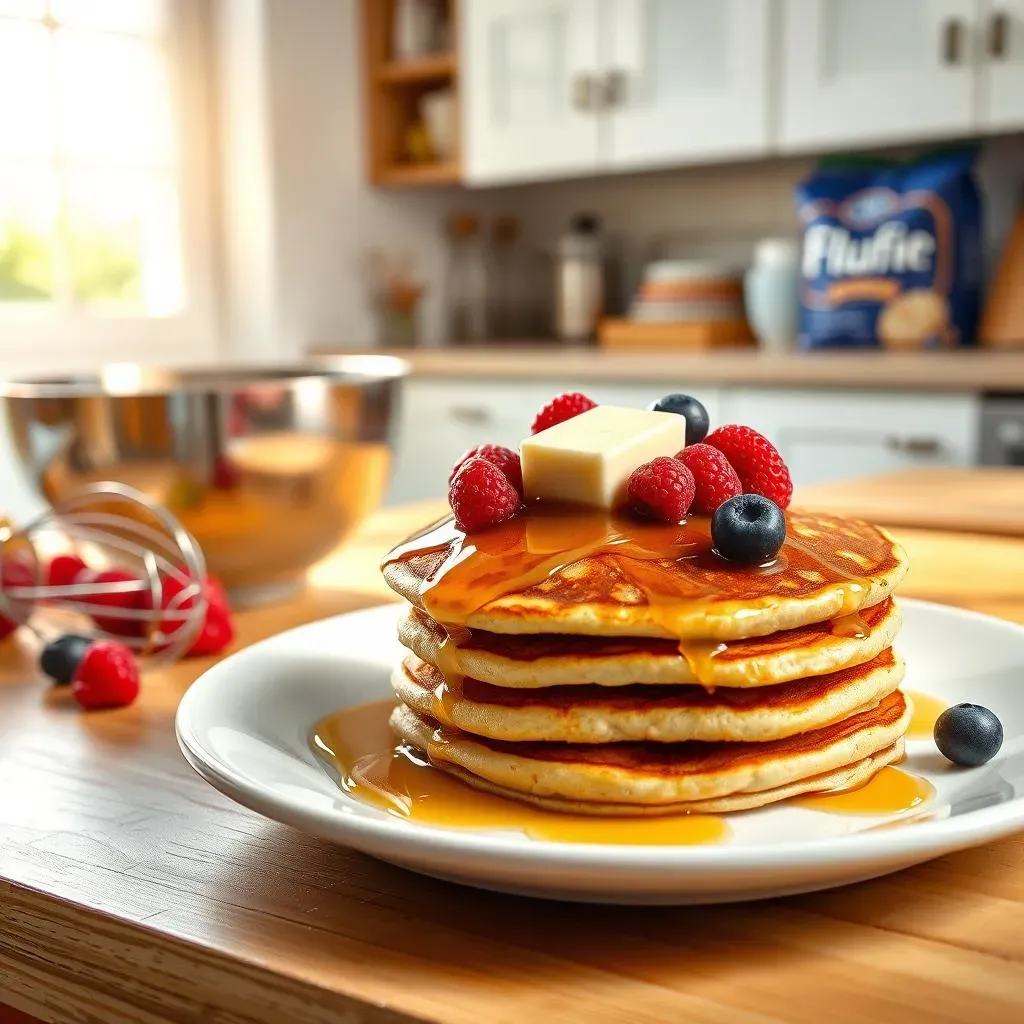
Why Martha Stewart's Pancake Recipe From Scratch is a Game Changer
Simplicity Meets Superior Taste
Let's be real, there are a million pancake recipes out there. So, what makes Martha Stewart's version a total game changer? It boils down to two things: simplicity and superior taste. She strips away the unnecessary fluff and focuses on the fundamentals, using fresh, high-quality ingredients to create a pancake that's both incredibly flavorful and surprisingly easy to make. It's the kind of recipe that becomes a weekend staple, one you can whip up without even thinking about it. I remember the first time I tried it, I was shocked at how much better it was than any boxed mix or other recipe I had tried. It's just…better.
The "From Scratch" Advantage
The magic truly lies in making pancakes from scratch. You control exactly what goes into them, avoiding preservatives and artificial flavors that often lurk in store-bought mixes. This allows you to tailor the recipe to your liking, experimenting with different flours, milks, and even spices. Plus, there's a certain satisfaction that comes from creating something delicious from simple ingredients. Martha understands this, and her recipe empowers you to become a pancake artist in your own kitchen.
Elevating the Everyday
Ultimately, Martha Stewart's pancake recipe from scratch is a game changer because it elevates the everyday. It transforms a simple breakfast into a special occasion, a moment to savor and enjoy. Whether you're serving them to your family on a Sunday morning or treating yourself to a solo brunch, these pancakes are guaranteed to bring a smile to your face. And that, my friends, is a game worth changing.
Here are some of the reasons why people love Martha's pancakes:
- Easy to follow instructions
- Uses simple ingredients
- Taste amazing
- Can be customized
Essential Ingredients for the Perfect Pancake Recipe From Scratch Like Martha
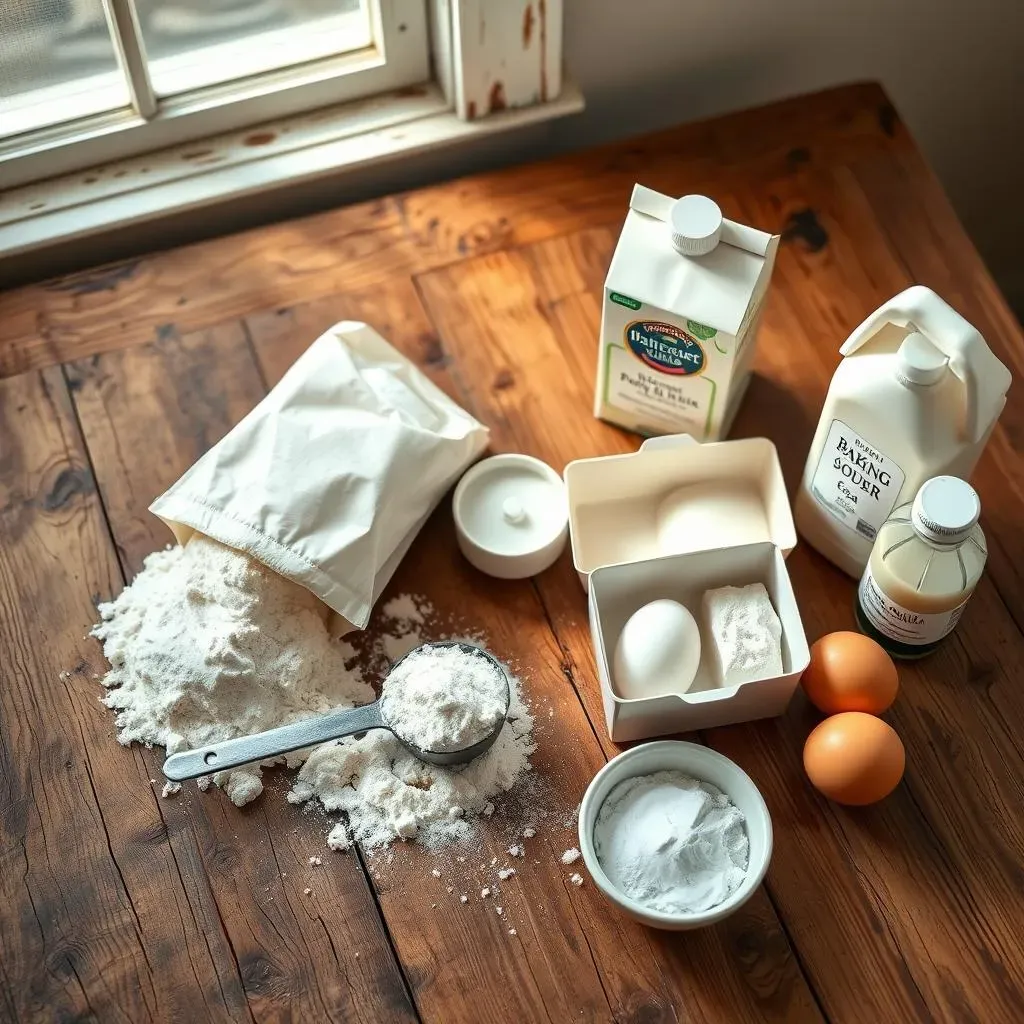
Essential Ingredients for the Perfect Pancake Recipe From Scratch Like Martha
The Flour Powerhouse
let's talk flour. This is the foundation of our pancake dreams, and Martha's recipe typically calls for all-purpose flour. But don't let that fool you into thinking it's boring! The quality of your flour matters. Go for unbleached all-purpose if you can, it has a slightly nutty flavor that adds depth. And here's a little secret: Martha sometimes swaps in a portion of whole-wheat flour for a heartier, more nutritious pancake. Just don't go overboard, or you'll end up with hockey pucks instead of fluffy clouds. I once tried using only whole wheat and, well, let's just say the birds enjoyed them more than I did!
And speaking of flour, keep it fresh. Stale flour can lead to flat, dense pancakes. So, if your flour has been sitting in the pantry for a while, give it a sniff. If it smells musty or off, it's time for a replacement. Trust me, your pancakes will thank you.
Leavening Legends: Baking Powder & Baking Soda
These two are the unsung heroes of fluffy pancakes. Baking powder is a complete leavening agent, meaning it contains both an acid and a base, which react to create carbon dioxide bubbles that lift the batter. Baking soda, on the other hand, needs an acid to activate, like buttermilk or yogurt (more on that later). Martha often uses a combination of both for maximum lift and a delicate crumb. The key here is to make sure your baking powder and baking soda are fresh. They lose their potency over time, resulting in flat, sad pancakes. A good rule of thumb is to replace them every six months or so.
To test if your baking powder is still good, add a teaspoon to a half cup of hot water. It should fizz vigorously. For baking soda, mix a teaspoon with a tablespoon of vinegar. Again, you're looking for a strong fizz. No fizz? Time to toss them out and buy new ones.
Ingredient | Why It Matters | Martha's Tip |
|---|---|---|
All-Purpose Flour | Provides structure | Use unbleached for better flavor |
Baking Powder | Creates lift and fluffiness | Ensure it's fresh for best results |
Baking Soda | Reacts with acid for extra lift | Use in combination with baking powder |
StepbyStep: Mastering Martha Stewart's Pancake Recipe From Scratch
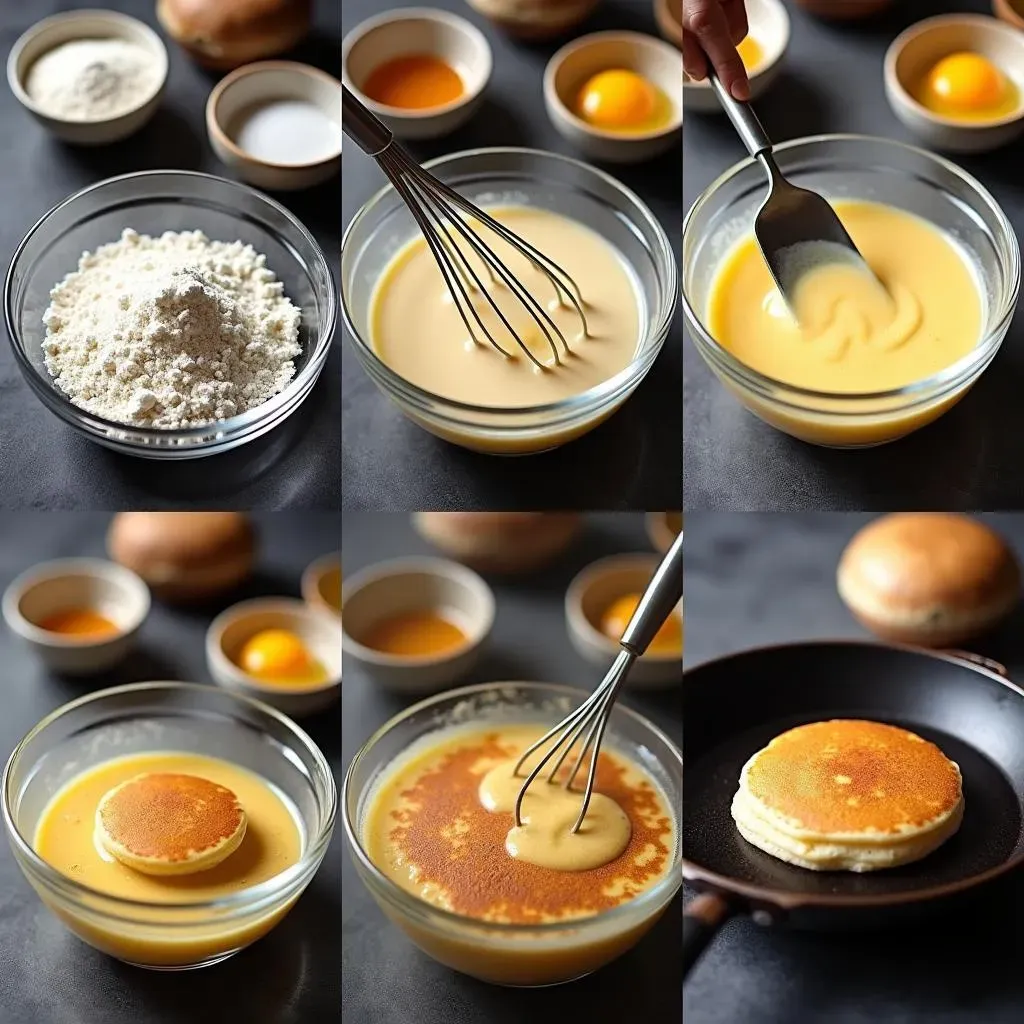
StepbyStep: Mastering Martha Stewart's Pancake Recipe From Scratch
Get Your Mise en Place Ready
Alright, future pancake pros, before we dive into the batter, let's channel our inner Martha and get organized. "Mise en place" is just a fancy French term for having all your ingredients prepped and ready to go. This means measuring out your flour, sugar, baking powder, baking soda, salt, milk, eggs, and melted butter. Trust me, it makes the whole process smoother and less stressful. Imagine trying to crack an egg with flour-covered hands – not a pretty picture! I like to use small bowls or ramekins to hold each ingredient, so I can just grab and go. It's like a pancake-making pit stop!
Also, don't forget your tools! You'll need a mixing bowl, a whisk, a measuring cup, a spatula, and a griddle or frying pan. Make sure your griddle is clean and lightly oiled or buttered. A well-prepared workspace is half the battle won, especially when you're aiming for pancake perfection.
Mixing the Batter Like a Pro
now for the fun part: making the batter! In a large bowl, whisk together your dry ingredients: flour, sugar, baking powder, baking soda, and salt. In a separate bowl, whisk together your wet ingredients: milk, eggs, and melted butter. Now, here's the key: gently fold the wet ingredients into the dry ingredients until just combined. I repeat, just combined! Overmixing develops the gluten in the flour, which leads to tough, chewy pancakes. You want a few lumps in the batter – that's perfectly fine. Think of it like a gentle hug, not a vigorous massage. Seriously, resist the urge to keep stirring!
Once your batter is ready, let it rest for about 5-10 minutes. This allows the gluten to relax and the leavening agents to do their thing, resulting in lighter, fluffier pancakes. While the batter is resting, preheat your griddle or frying pan over medium heat. You want it hot enough so that a drop of water sizzles and evaporates within a few seconds. And remember, patience is a virtue, especially when it comes to pancakes.
Step | Description | Why It Matters |
|---|---|---|
1. Mise en Place | Measure and prepare all ingredients | Ensures a smooth and efficient process |
2. Combine Dry Ingredients | Whisk together flour, sugar, baking powder, baking soda, and salt | Evenly distributes leavening agents |
3. Combine Wet Ingredients | Whisk together milk, eggs, and melted butter | Creates a smooth and emulsified base |
4. Combine Wet and Dry | Gently fold wet into dry until just combined | Prevents overmixing and tough pancakes |
5. Rest the Batter | Let the batter rest for 5-10 minutes | Allows gluten to relax and leavening agents to activate |
Tips and Tricks for Fluffy Pancakes Like Martha Stewart Makes
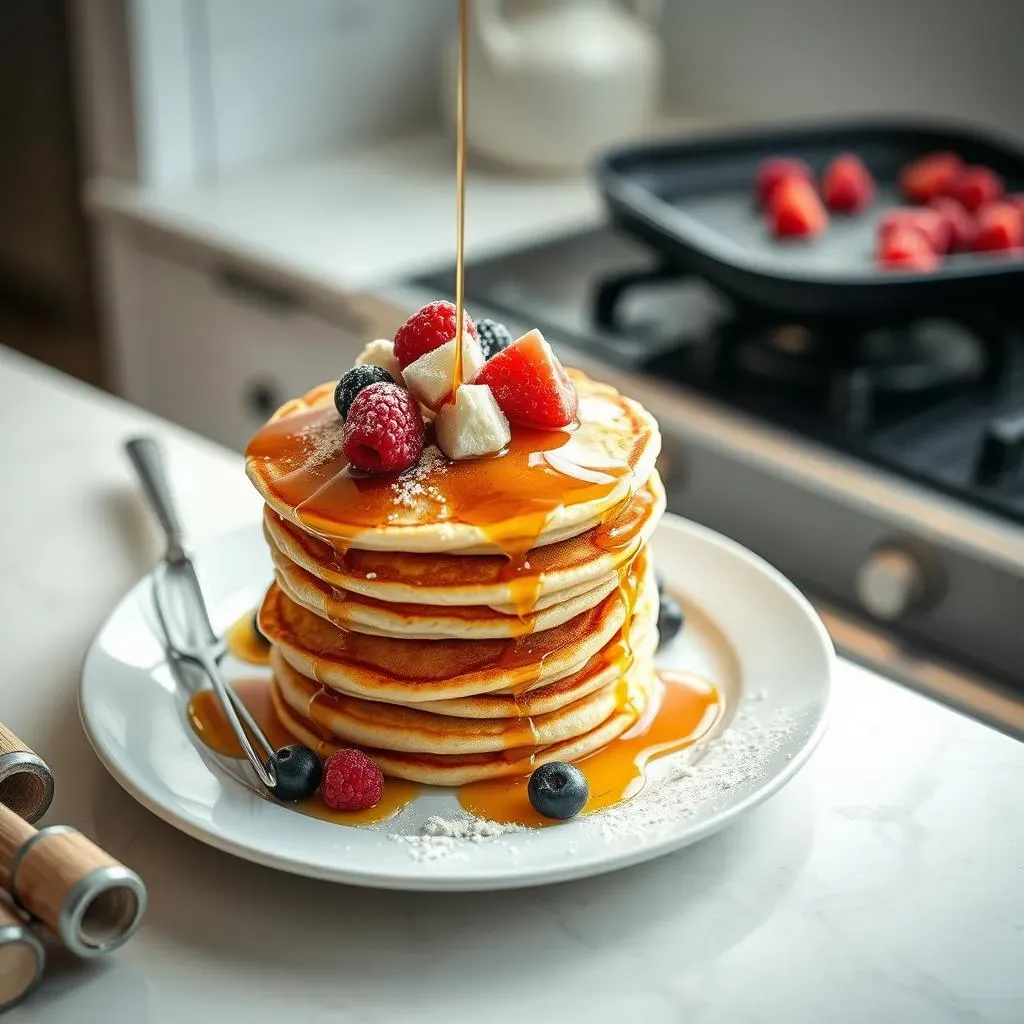
Tips and Tricks for Fluffy Pancakes Like Martha Stewart Makes
Don't Overmix: The Golden Rule
I can't stress this enough: overmixing is the enemy of fluffy pancakes. Remember that gentle hug we talked about? Treat your batter with the same care. Overmixing develops the gluten in the flour, resulting in tough, chewy pancakes. You want a light, airy batter with a few lumps – that's a good thing! Think of it this way: those lumps are pockets of air waiting to explode into fluffy goodness on the griddle. So, resist the urge to keep stirring until the batter is perfectly smooth. Embrace the lumps!
Also, it's important to add the wet ingredients to the dry ingredients, not the other way around. This helps prevent overmixing by ensuring that the flour is coated in liquid before you start stirring. And use a whisk, not a spoon, to combine the ingredients. A whisk is much gentler and less likely to overwork the gluten.
Temperature is Key: Hot Griddle, Happy Pancakes
The temperature of your griddle is crucial for achieving that perfect golden-brown exterior and fluffy interior. You want it hot enough so that a drop of water sizzles and evaporates within a few seconds, but not so hot that the pancakes burn before they're cooked through. Medium heat is usually a good starting point, but you may need to adjust it depending on your griddle. Martha recommends testing the temperature with a small amount of batter before you start cooking the whole batch. This allows you to fine-tune the heat and ensure that your pancakes are cooking evenly.
Also, be patient! Don't flip the pancakes until they're golden brown on the bottom and have bubbles forming on the surface. This usually takes about 2-3 minutes per side. And resist the urge to press down on the pancakes with your spatula while they're cooking. This flattens them and prevents them from rising properly.
The Resting Game: Patience Pays Off
We touched on this earlier, but it's worth repeating: resting the batter is essential for fluffy pancakes. Letting the batter sit for 5-10 minutes allows the gluten to relax and the leavening agents to do their thing. This results in lighter, airier pancakes that are less likely to be tough or chewy. While the batter is resting, you can preheat your griddle, prepare your toppings, or just relax and enjoy a cup of coffee. Trust me, the wait is worth it!
Also, don't be tempted to add more liquid to the batter if it seems too thick. The batter will thin out as it rests, so just be patient. And if you're making a large batch of pancakes, you can keep the batter in the refrigerator for up to an hour. Just give it a gentle stir before you start cooking.
Tip | Description | Why It Works |
|---|---|---|
Don't Overmix | Gently fold wet into dry until just combined | Prevents tough, chewy pancakes |
Hot Griddle | Cook on a medium-hot griddle | Ensures golden-brown exterior and fluffy interior |
Rest the Batter | Let the batter rest for 5-10 minutes | Allows gluten to relax and leavening agents to activate |
Serving Suggestions and Variations on Martha Stewart's Pancake Recipe From Scratch
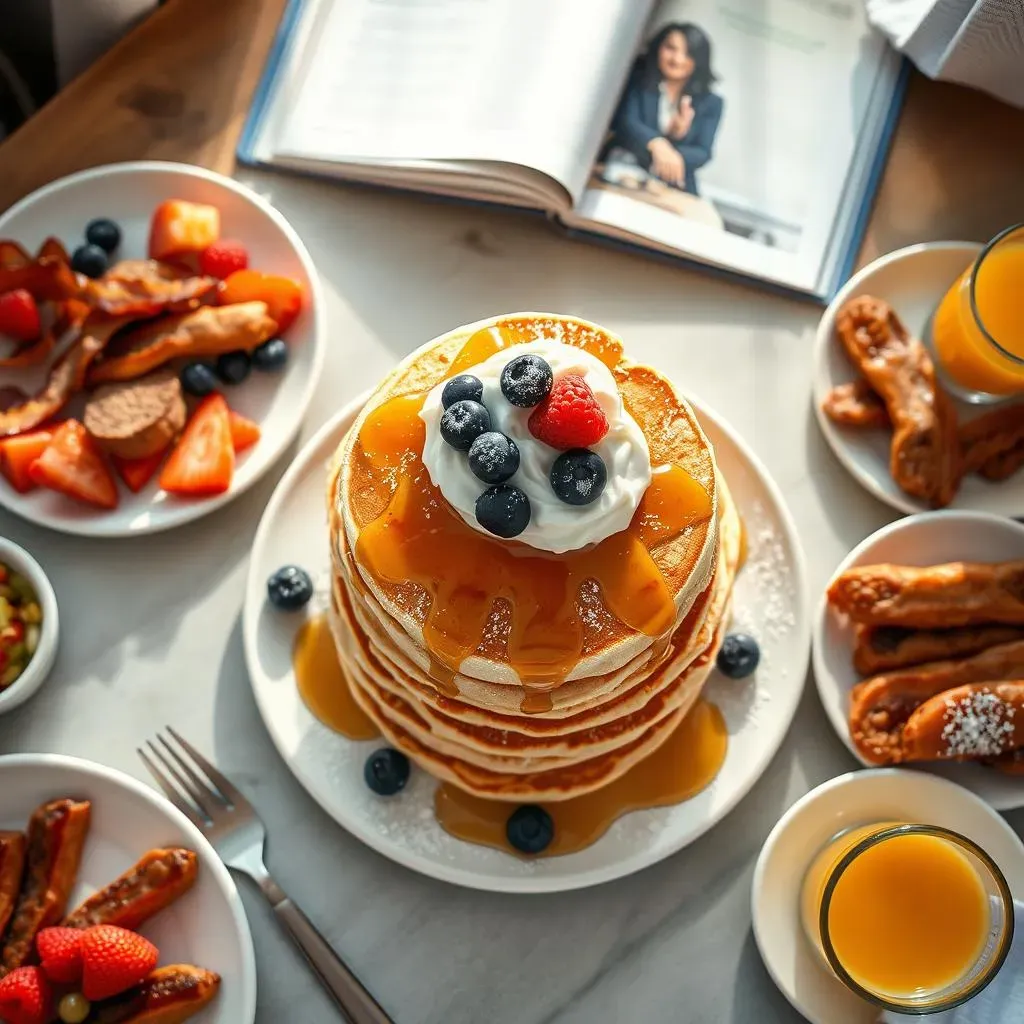
Serving Suggestions and Variations on Martha Stewart's Pancake Recipe From Scratch
Stack 'Em High: Classic Serving Suggestions
Alright, you've nailed the pancake recipe from scratch, Martha Stewart style. Now, let's talk about how to serve these beauties! The classic approach is always a winner: a generous pat of butter, a drizzle of pure maple syrup, and maybe a dusting of powdered sugar. But don't be afraid to get creative! Fresh berries, sliced bananas, chopped nuts, whipped cream, chocolate chips – the possibilities are endless. I personally love a dollop of Greek yogurt and a sprinkle of granola for a healthier twist. My kids, on the other hand, are all about the chocolate syrup and sprinkles. It's all about finding what you love and making it your own!
And don't forget the sides! Crispy bacon, savory sausage, or a side of scrambled eggs are all great accompaniments to a stack of fluffy pancakes. Or, for a lighter meal, try serving them with a fruit salad or a smoothie. The goal is to create a balanced and satisfying breakfast that will fuel you up for the day ahead.
Topping | Why It Works | Martha's Touch |
|---|---|---|
Maple Syrup | Classic sweetness | Use pure maple syrup for the best flavor |
Fresh Berries | Adds freshness and antioxidants | Arrange artfully for a beautiful presentation |
Whipped Cream | Light and airy indulgence | Make your own for extra flavor and control |
Chocolate Chips | Sweet and melty goodness | Use high-quality chocolate for the best taste |
Beyond the Basics: Fun and Flavorful Variations
Once you've mastered the basic pancake recipe from scratch, Martha Stewart encourages you to experiment and make it your own. One of the easiest ways to do this is by adding different flavorings to the batter. A teaspoon of vanilla extract, a pinch of cinnamon, or a grating of nutmeg can all add a subtle but delicious twist. For a more pronounced flavor, try adding a tablespoon or two of cocoa powder for chocolate pancakes, or a handful of chopped blueberries for blueberry pancakes. You can even add a splash of citrus zest for a bright and refreshing flavor.
Another fun variation is to use different types of flour. As we discussed earlier, you can substitute a portion of the all-purpose flour with whole-wheat flour for a heartier pancake. Or, for a gluten-free option, try using a gluten-free flour blend. Just be sure to adjust the liquid accordingly, as gluten-free flours tend to absorb more moisture. And don't be afraid to get really creative! I've seen people add everything from mashed bananas to shredded coconut to their pancake batter. The only limit is your imagination!
Global Pancakes: Taking Inspiration From Around the World
Pancakes are a global phenomenon, and there are countless variations from around the world to inspire your creations. Crêpes from France are thin and delicate, perfect for filling with sweet or savory toppings. Dutch babies are baked in the oven until puffed and golden brown, often served with fruit and powdered sugar. Japanese soufflé pancakes are incredibly light and airy, almost like clouds. And Korean savory pancakes, or pajeon, are made with scallions and other vegetables, offering a delicious and satisfying meal.
Exploring these different pancake traditions can be a fun and educational way to expand your culinary horizons. You might discover a new favorite flavor combination or technique that you can incorporate into your own pancake recipe from scratch. So, don't be afraid to venture beyond the familiar and try something new!
- Buttermilk Pancakes: Adds a tangy flavor and extra fluffiness.
- Chocolate Chip Pancakes: A classic favorite for kids and adults alike.
- Blueberry Pancakes: Bursting with fresh, fruity flavor.
- Banana Pancakes: Naturally sweet and moist.
- Cinnamon Roll Pancakes: Swirls of cinnamon sugar for a decadent treat.
Conclusion: Your Journey to Pancake Perfection with Martha Stewart
So, there you have it – your comprehensive guide to mastering a pancake recipe from scratch Martha Stewart style. From understanding the importance of fresh ingredients to perfecting your flipping technique, you're now equipped to create breakfast magic. Remember, the key to truly exceptional pancakes lies in the details: don't overmix the batter, use a hot griddle, and embrace those little imperfections. Now, go forth and whip up a stack of fluffy, golden pancakes that would make Martha herself proud! And most importantly, enjoy the delicious results of your newfound pancake prowess. Happy cooking!